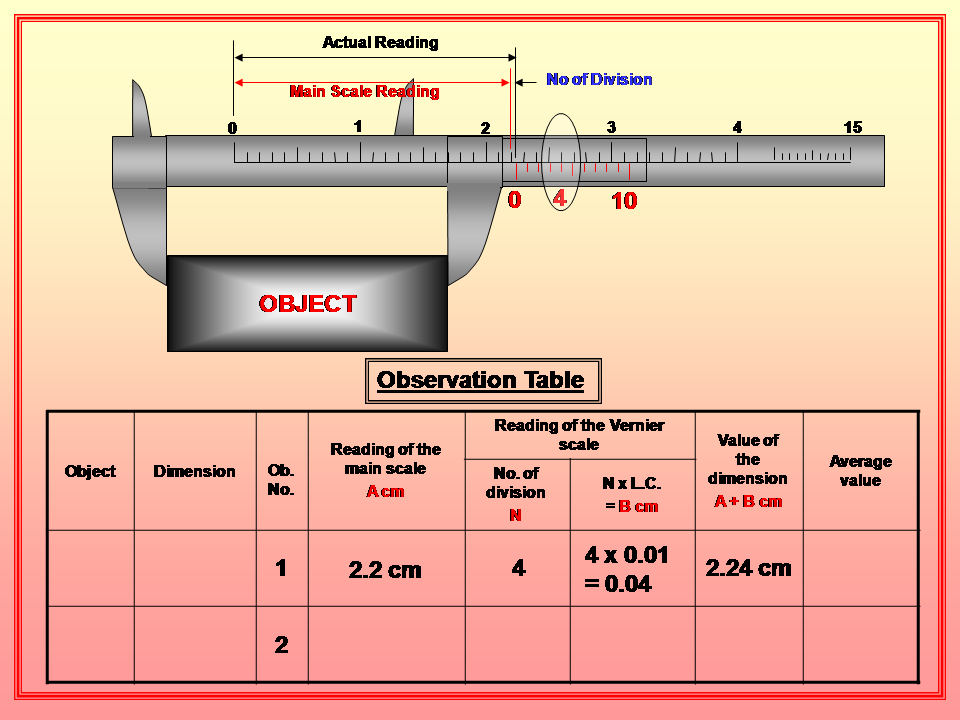Vernier calliper measuring instrument for ITI fitter and Gseb students.
A calliper is a device used to measure the distance between two opposing sides of an object. It can be as simple as a compass with inward or outward-facing points. First the tips of the calliper are adjusted to fit across the points to be measured and the calliper is then removed and the distance between the tips is measured using a ruler.
The modern Vernier calliper was invented by Joseph R. Brown in 1851. It was the first practical tool for exact measurements that could be sold at an affordable price to ordinary machinists. The Vernier Calliper consists of a main scale fitted with a jaw at one end. Another jaw, containing the vernier scale, moves over the main scale. When the two jaws are in contact, the zero of the main scale and the zero of the Vernier scale should coincide. If both the zeros do not coincide, there will be a positive or negative zero error.
1.Main Scale
The main scale consists of a steel metallic strip graduated in centimeters at one edge and in inches at the other edge . It carries the inner and outer measuring jaws. When the two jaws are in contact, the zero of the main scale and the zero of the Vernier scale should coincide. If both the zeros do not coincide, there will be a positive or negative zero error.
2. Vernier Scale
A vernier scale slides on the strip. It can be fixed in any position by the retainer. On the Vernier scale, 0.9 cm is divided into ten equal parts.
3. Outer Measuring Jaws
The outer measuring jaws helps to take the outer dimension of an object
4. Inner Measuring Jaws
The inner measuring jaws helps to take the inner dimension of an object.
5. Retainer
The retainer helps to retain the object within the jaws of the Vernier calipers.
6. Depth Measuring Prong
The depth measuring prong helps to measure the depth of an object.
Least Count
The least count or the smallest reading which you can get with the instrument can be calculated as;
First calculate the least count and only then place the object between the two jaws.
Record the position of zero of the Vernier scale on the main scale.
Calculating the Reading
When a body is between the jaws of the Vernier Calliper.
More details view video:
 |
| Vernier calliper |
A calliper is a device used to measure the distance between two opposing sides of an object. It can be as simple as a compass with inward or outward-facing points. First the tips of the calliper are adjusted to fit across the points to be measured and the calliper is then removed and the distance between the tips is measured using a ruler.
The modern Vernier calliper was invented by Joseph R. Brown in 1851. It was the first practical tool for exact measurements that could be sold at an affordable price to ordinary machinists. The Vernier Calliper consists of a main scale fitted with a jaw at one end. Another jaw, containing the vernier scale, moves over the main scale. When the two jaws are in contact, the zero of the main scale and the zero of the Vernier scale should coincide. If both the zeros do not coincide, there will be a positive or negative zero error.
1.Main Scale
The main scale consists of a steel metallic strip graduated in centimeters at one edge and in inches at the other edge . It carries the inner and outer measuring jaws. When the two jaws are in contact, the zero of the main scale and the zero of the Vernier scale should coincide. If both the zeros do not coincide, there will be a positive or negative zero error.
 |
| Vernier calliper |
 |
| Least count of Vernier |
 |
| Vernier calliper Main Scale |
 |
| Vernier calliper |
 |
| Vernier calliper calculation |
 |
| Vernier Calliper |
 |
| vernier calliper least count |
 |
| vernier calliper least count |
 |
| vernier calliper least count |
 |
| vernier calliper least count and Table |
 |
| vernier calliper Measuring rectangle |
 |
| vernier calliper Measuring rectangle |
 |
| vernier calliper Measuring rectangle |
 |
| vernier calliper Measuring rectangle |
 |
| vernier calliper Measuring rectangle |
 |
| vernier calliper Measuring rectangle |
 |
| vernier calliper Measuring rectangle |
 |
| vernier calliper Measuring rectangle |
 |
| vernier calliper Measuring rectangle |
A vernier scale slides on the strip. It can be fixed in any position by the retainer. On the Vernier scale, 0.9 cm is divided into ten equal parts.
3. Outer Measuring Jaws
The outer measuring jaws helps to take the outer dimension of an object
4. Inner Measuring Jaws
The inner measuring jaws helps to take the inner dimension of an object.
5. Retainer
The retainer helps to retain the object within the jaws of the Vernier calipers.
6. Depth Measuring Prong
The depth measuring prong helps to measure the depth of an object.
Least Count
The least count or the smallest reading which you can get with the instrument can be calculated as;
First calculate the least count and only then place the object between the two jaws.
Record the position of zero of the Vernier scale on the main scale.
Calculating the Reading
When a body is between the jaws of the Vernier Calliper.
More details view video:
Vernier calliper video Measuring rectangle practical.
No comments:
Post a Comment